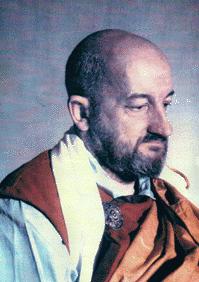Theosophical Society
The Sanskrit term
akasha was introduced to the language of theosophy through
H. P. Blavatsky (1831–1891), who characterized it as a sort of life force; she also referred to "indestructible tablets of the astral light" recording both the past and future of human thought and action, but she did not use the term "akashic".
[5] The notion of an akashic
record was further disseminated by
Alfred Percy Sinnett in his book
Esoteric Buddhism (1883) when he cites
Henry Steel Olcott's
A Buddhist Catechism (1881).
[6] Olcott wrote that "Buddha taught two things are eternal, viz, 'Akasa' and 'Nirvana': everything has come out of Akasa in obedience to a law of motion inherent in it, and, passes away. No thing ever comes out of nothing." Olcott further explains that "Early Buddhism, then, clearly held to a permanency of records in the Akasa and the potential capacity of man to read the same, when he was evoluted to the stage of true individual enlightenment."
[7]
By
C. W. Leadbeater's
Clairvoyance (1899) the association of the term with the idea was complete, and he identified the akashic records by name as something a
clairvoyant could read.
[5] In his 1913
Man: Whence, How and Whither, Leadbeater claims to record the history of
Atlantis and other civilizations as well as the future society of
Earth in the 28th century.
[5][8]
Alice A. Bailey wrote in her book
Light of the Soul on
The Yoga Sutras of Patanjali – Book 3 – Union achieved and its Results (1927):
The akashic record is like an immense photographic film, registering all the desires and earth experiences of our planet. Those who perceive it will see pictured thereon: The life experiences of every human being since time began, the reactions to experience of the entire animal kingdom, the aggregation of the thought-forms of a
karmic nature (based on desire) of every human unit throughout time. Herein lies the great deception of the records. Only a trained occultist can distinguish between actual experience and those astral pictures created by imagination and keen desire.
Rudolf Steiner
The
Austrian theosophist, and later founder of
Anthroposophy,
Rudolf Steiner used the Akashic records concept mainly in a series of articles in his journal
Lucifer-Gnosis from 1904 to 1908, where he wrote about
Atlantis and
Lemuria, topics related to their purported history and civilization.
[9] Besides this, he used the term in the title of lectures on a
Fifth Gospel held in 1913 and 1914, shortly after the foundation of the
Anthroposophical Society and Steiner's exclusion from the
Theosophical Society Adyar.
[10]


